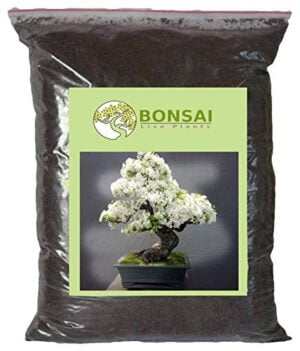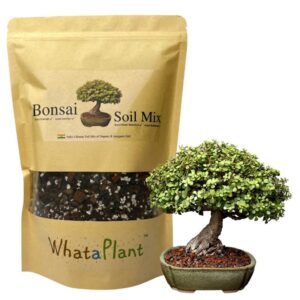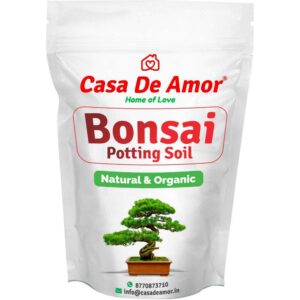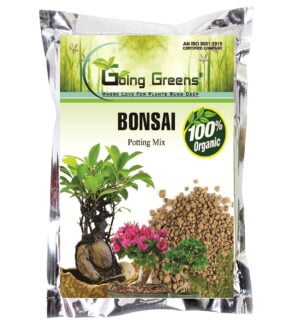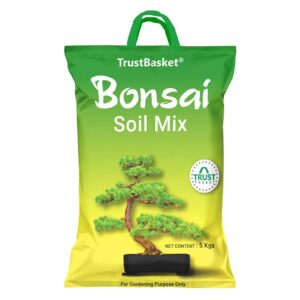- ₹199.00 – ₹699.00
- Original price was: ₹400.00.₹299.00Current price is: ₹299.00.
- Original price was: ₹500.00.₹399.00Current price is: ₹399.00.
- Original price was: ₹600.00.₹399.00Current price is: ₹399.00.
- Original price was: ₹400.00.₹299.00Current price is: ₹299.00.
What is bonsai soil?
This bonsai soil is vital since it aids in the appropriate nutrition of the tree, allowing it to thrive for decades. Bonsai tree Soil has been professionally created and tested to include the best nutritional blend for each variety of Bonsai Plant. Our bonsai soil in India implies a mix that produces lush year-round growth, brilliant needles, and long, happy life for Bonsai. To create an elegant look for your plant, bonsai soil is used to grow huge trees in smaller and regular pots. It’s been specially developed as an all-purpose potting media for almost any Bonsai Plant.
Bonsai Soil Components?
Bonsai soil contains four essential ingredients:
Akadama, pumice, lava rocks, Pine bark leaves
- Lava rock is most renowned for its excellent drainage properties, making it an essential component of practically every bonsai tree soil mix.
- One can find over 70 different traces of vitamins and minerals in pumice, essential for developing a healthy and robust root system.
- Akadama is a fine clay that holds water and functions as an acidifier, ensuring that your Bonsai soil doesn’t dry out over the day.
- Pine bark absorbs nutrients well and then gently releases them back to the tree as required.
Types of Bonsai Soil
Organic Bonsai Soil
Dead plant matter makes organic bonsai soil. Peat and pine bark are examples of this. Bonsai farmers employed organic soil mixtures in prior decades, believing they were the best option. Following extensive research, bonsai enthusiasts now choose inorganic soil over organic substrates, realizing organic substrates do not meet all of Bonsai roots.
Organic soil can retain a lot of water during rainy seasons, but it’s tough to irrigate when the weather is hot. Organic bonsai soil decomposes over time and can become compacted. Aeration and drainage become challenging as the earth becomes compacted.
Inorganic Bonsai Soil
Akadama, pumice, and lava rock are examples of popular inorganic substrates. Inorganic soil has a number of advantages, the most important of which is that it does not break down quickly, allowing for good aeration and drainage. It will drain the remaining water through the bottom of the pot once it has soaked up a particular amount of water.
How to Choose the Best Bonsai Soil?
Understanding the method required for the roots to grow is the first step in selecting the suitable soil for your bonsai soil in India. It will help you better comprehend the components utilized to construct your bonsai’s substrate. Because the roots of your bonsai tree require water, the substrate in which they are planted must be able to retain it. They must be able to breathe air. Hence aeration must be possible. There must be good drainage to balance water retention and aeration.
Where to Buy Bonsai Soil
Abana Homes is the ideal place to buy bonsai soil online as it has all the nutrients your bonsai tree requires. Our bonsai soil online will live up to your expectations making your bonsai plants live healthier for a long time.
Faqs
Can I add bonsai soil to some other potting mix to help improve the drainage?
Yes, you can mix bonsai soil online with any other potting mix to improve drainage.
Is it necessary to replace my bonsai soil on a regular basis?
It’s good to replace all of your bonsai tree soil after repotting your bonsai (every couple of years).
Is there different soil for different bonsai plants?
Yes, of course. Though all Bonsai soil online requires free-draining, water-retentive soils, different species’ water and nutrient requirements vary. It should reflect in the soil they use.
Based on specific blends used by gardeners worldwide, the Abana Homes bonsai mix is expertly developed to fulfill your bonsai’s physical and nutritional needs. Buy bonsai soil online, as it has been produced to suit the nutritional aspect of your different species of bonsai trees.
Why should you choose bonsai soil over potting soil?
If you want to grow your bonsai plant, you should use bonsai soil in India. It has qualities that are considerably different from typical potting soil when growing a tree.
Bonsai Soil
- Akadama, pumice, lava rocks, organic potting compost, and fine gravel make up this soil combination.
- Bonsai soil absorbs water reasonably, making it ideal for bonsai trees.
- Appropriate for the healthy development of the tree’s roots and branches.
- It is advised that trees be planted in bonsai soil, although regular upkeep is required due to the slowness of the process.
Potting Soil
- Moss, perlite, and bark make up the soil composition. It lacks real dirt and minerals.
- Potting soil holds more water than bonsai soil, which causes bonsai trees to rot.
- You use potting soil to promote rapid tree development by assisting the plant in growing taller.
- Planting bonsai trees in potting soil is fine because they will grow large but not last long due to a lack of minerals.
Is it possible to repot my bonsai in ordinary plant soil?
Don’t do it if you want to maintain your bonsai plant soil healthy. You’ll want to choose a bonsai soil in India that drains well. When you water your tree, make sure it runs through the holes on the bottom of the pot.
Why should you repot your bonsai?
Every Bonsai tree necessitates the presence of air, water, and sunlight. Because your Bonsai will be growing in a small pot with a limited amount of soil, its roots will eventually fill in the spaces. As a result, ventilation in the bonsai plant soil is reduced, which slows the growth of the roots. It affects the health of the Bonsai tree at the top. If not addressed over a lengthy period, this will lead your bonsai to stop developing.
Why shouldn’t you use potting soil?
Bonsai soils are created specifically for planting bonsai plants because of their unique characteristics. Bonsai soils should not be substituted with potting soils. If you’re serious about keeping your bonsai trees alive, potting soil isn’t the way to go. You can create a change by mixing coarser dirt into the potting mix.
Ordinary plants are nothing like bonsai trees. Bonsai trees necessitate extra caution and patience.
Why is bonsai soil important?
Bonsai soil mix is meticulously prepared and sifted to eliminate dust. It’s suitable for water retention, aeration, and root development because of this mechanism. We have the most excellent bonsai soil mixes at Abana Homes, which gives your bonsai the right consistency and nutrition every time!
The health of your bonsai’s roots determines its overall health. The soil in which your bonsai tree is planted provides the foundations for those roots, making it crucial to its growth, health, and survival. You can imagine how critical it is to ensure that the proper foundations are laid.
Don’t make the common error of planting your bonsai in ordinary potting soil. The density of regular potting soil is far too high. Using bonsai potting soil takes the guesswork of caring for your bonsai to perfection.
Average garden soil is useless for bonsai because it hardens as it dries. It is incredibly harmful to your bonsai’s longevity. Bonsai that do not survive, grow, or age well are frequently the result of being planted in inadequate soil. Our Bonsai potting mix puts your bonsai plants in the best position to thrive for years to come.

